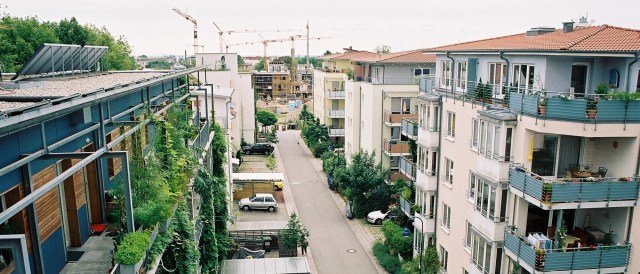A barracks as a forerunner in terms of urban development and sustainable living? What sounds like a mismatch is today the home of more than 5,000 citizens of Freiburg, Germany in a district called Vauban, as Julian Wortmann explains.

Much-cited example for sustainable urban planning involving citizen participation: Vauban, Freiburg. (Photo by ADEUPa Brest, CC BY-NC-SA 2.0)
When the French troops left after the Cold War in the beginning of the 1990s the city of Freiburg saw a great opportunity to meet the rising demand for housing space and decided to develop a new district in this area.
Extended civic participation – giving power to the people
With this urban development aspiration of the municipal government, some citizens felt that the time had come to implement their dream of a livable and eco-just district. For this purpose they founded the association Forum Vauban in 1994.
The German urban land-use planning regulated in German federal law mandates an early public participation of citizens in planning processes. The problem, however, is that public interest is very low during the initial, more abstract, stages planning process. Interest increases in the concrete implementation stage when construction begins – usually too late to influence the project.
In the case of Vauban, Forum Vauban and the municipal government managed to skirt this problem via an extended civic participation process. The municipal government named the association as coordinator of the extended civic participation.
Financially supported by the German Environmental Foundation (DBU) and the EU programme LIFE, Forum Vauban achieved such a high level of professionalisation that it could provide organisational and content support for the planning process and was recognized by the municipal government as a capable supporter of the idea of a sustainable model district. As a consequence the association obtained a seat in the local government’s working group on Vauban, through which it was able to transport citizens’ suggestions into the political discussion.
Extended civic participation not only provided a higher rate of transparency thanks to the “outsourcing” of the participation from the bureaucratic machinery, it also increased the influence of citizens on the outcome of the planning process as they became involved at the stage when they had the most power – at the beginning of the planning process.
Identifying with a district that is truly “yours”
Collaborating in several working groups, prospective inhabitants and interested citizens gave inputs to aspects of the new district like energy supply, water and waste management, mobility and political participation. With the people believing in the feasibility of their ideas and pushing them forward, when faced with the utopian ideas of its citizens even the municipal government of Freiburg, known as one of the most progressive in Germany, got cold feet and withheld approval to some of their proposals.
In contrast to other cities where the participation process is finished once the land-use planning is concluded, Forum Vauban continued past this stage. The association organised planning workshops with prospective inhabitants on the design of the residential streets and the open green space in-between the row of houses. In this way they succeeded in making Vauban a district that was truly “theirs”, accompanied by positive effects such as social cohesion and an increased concern and feeling of responsibility for their living environment.
The result: A district of the 21st century
The result of this process has a strong impact on the daily life of Vauban’s residents. One of the most important aspects is the sustainable supply of energy:. A south alignment of all houses was considered in the land-use plan – and through that became mandatory for all homeowners – giving a great potential to use solar energy for electricity and heat generation. A communal combined heat and power plant powered by wood chips provide for the low-energy and passive houses in the district.
Following the model of a compact district, residents benefit from having the daily needs within a small radius from their homes. This is the basis of Vauban’s outstanding mobility concept. Vauban’s citizens should be able be as mobile as car owners without owning a car. The result is a district with a speed limit of 30 km/h – on the main road! Some streets are only drivable for purposes like loading and unloading, while others are only bike and pedestrian ways. Parking is located on the outskirts of the district, with the result that on average Vauban’s citizen own three times fewer cars per head than in the rest of Freiburg. The “low in cars” district leads to a situation in public space very different from conventional ones. The streets become a place to be and to meet neighbours and friends, improving the quality of life, promoting communication of residents and providing a place for social participation.
Urban development starts in the quarter
The district Vauban is proof that an eco-just way of life in districts is plannable. But urban politics and planning affects not only the ecological footprint of a district or a whole city but also the quality of living. In any case civic participation plays an outstanding role regarding the trend of urban development. Progressive ideas, many of them implemented in Vauban, can only become reality if citizens are convinced of these ideas and support them. Besides, and maybe even more importantly, participation processes enable citizens to be the forerunner themselves in implementing their ideas of a better future. To be sure, participation processes cost a lot of time and money but the example of Vauban is evidence of their enormous potential to initiate change – because sustainable urban development starts in the quarter.
This article by Julian Wortmann is reposted with permission and was first published at World Future Council.